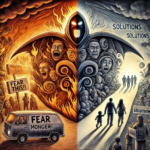When we hear the word slavery, many of us think of a distant, painful past—chains, plantations, and abolitionist movements. But slavery didn’t end with the Emancipation Proclamation or the abolition laws passed around the world. It has simply taken on new forms, hidden behind the curtain of modern convenience and global trade. From human trafficking to exploitative labor in supply chains, slavery is thriving today, and often, we’re unknowingly complicit in it.
A Glimpse Into Modern-Day Slavery
Consider the device you’re using to read this. The cobalt that powers its battery may have been mined by children in the Democratic Republic of Congo. These children labor in unsafe, grueling conditions, risking their lives for wages that barely sustain them. The same can be said of the clothing industry, where garment workers in factories—sometimes referred to as “sweatshops”—work for long hours in unsafe environments, often for a few dollars a day.
Even closer to home, human trafficking remains a devastating issue. Cartels and organized crime syndicates smuggle vulnerable people into countries under false promises of freedom or opportunity. Many end up trapped in sex slavery or forced labor, unable to escape. It’s a cruel, multi-billion-dollar industry that preys on the desperate and exploits the overlooked.
This isn’t happening in some far-off, inaccessible world. It’s happening everywhere, right now.
The Bible Speaks to These Injustices
Scripture has never been silent about issues of oppression and exploitation. God’s heart for justice is clear throughout the Bible. In Proverbs 31:8-9, we’re called to “Speak up for those who cannot speak for themselves, for the rights of all who are destitute. Speak up and judge fairly; defend the rights of the poor and needy.”
The responsibility doesn’t end at speaking—it extends to exposing evil and taking action. Ephesians 5:11 commands us to “Have nothing to do with the fruitless deeds of darkness, but rather expose them.” Ignoring these injustices or remaining silent allows them to flourish, but by shining a light on these practices, we can begin to dismantle them.
God also calls us to care deeply for the oppressed. Isaiah 1:17 says, “Learn to do right; seek justice. Defend the oppressed. Take up the cause of the fatherless; plead the case of the widow.” This isn’t just a passive suggestion—it’s an active, moral duty for those who follow Christ.
Why This Matters Today
In today’s society, it’s easy to become distracted. Media narratives focus on divisive debates or trivial controversies, drawing our attention away from deeper issues like modern slavery. But while we’re arguing over microaggressions, millions of people are suffering in silence—forced into labor, sold into trafficking, or exploited in global supply chains.
The world’s powers—whether governments, corporations, or cartels—have a vested interest in keeping these truths buried. Exposing them would disrupt systems of profit and control. It’s up to individuals and communities, especially those grounded in faith, to bring these injustices to light.
What Can We Do?
- Raise Awareness: Educate yourself and others about modern slavery. Learn about supply chains, the industries involved, and the human cost of the products we consume.
- Support Ethical Practices: Look for brands that prioritize fair trade and transparency. Though it’s challenging to eliminate all unethical products, small changes can have a big impact.
- Advocate for Change: Speak out in your community and support organizations fighting against trafficking and exploitation. Petition governments to strengthen laws and enforce them.
- Pray and Act: Ask God for wisdom and courage to take meaningful steps. Pray for those trapped in slavery and for the dismantling of these evil systems.
As Micah 6:8 reminds us: “He has shown you, O mortal, what is good. And what does the Lord require of you? To act justly and to love mercy and to walk humbly with your God.”
The world can seem overwhelming, but God calls us to be the light in the darkness. By exposing injustice, defending the vulnerable, and seeking His guidance, we can make a difference. The systems that uphold modern slavery thrive on silence and apathy. Together, and with God’s help, we can choose to be the voice for those who cannot speak for themselves.
Sources
- Cobalt Mining and Modern Slavery: The Democratic Republic of Congo (DRC) supplies over 70% of the world’s cobalt, a critical component in rechargeable batteries for smartphones, laptops, and electric vehicles. Many workers, including children, labor in hazardous conditions for minimal pay, often without protective gear. Siddharth Kara’s research highlights that “artisanal” mining and industrial supply chains are deeply intertwined, creating severe exploitation.
Ecowatch | Relevant Magazine - Human Trafficking Statistics: The U.N. estimates that there are over 50 million victims of modern slavery globally, including forced labor and trafficking. Exploitation occurs in sectors such as agriculture, mining, and manufacturing, with systemic issues linked to global supply chains.
Context | Ecowatch - Renewable Energy Supply Chains: Reports reveal that clean energy technologies like solar panels, wind turbines, and EV batteries are tied to forced labor and exploitation, particularly in regions like the Xinjiang province of China and mining operations in Africa and South America. Addressing these issues is essential for ensuring ethical transitions to renewable energy.
Ecowatch - Cartel Involvement in Human Trafficking: Criminal organizations, including cartels, profit from human trafficking by exploiting migrants for labor and sex work. This highlights the intersection of organized crime and exploitation in current immigration crises.
Context


